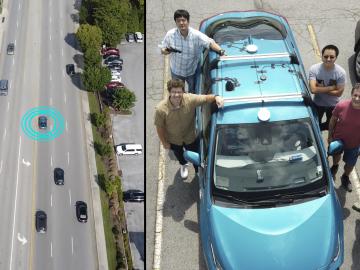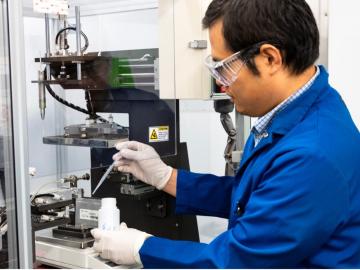
Filter News
Area of Research
- Advanced Manufacturing (1)
- Biology and Environment (16)
- Computational Biology (1)
- Computational Engineering (2)
- Computer Science (2)
- Energy Frontier Research Centers (1)
- Energy Science (83)
- Energy Sciences (1)
- Fusion and Fission (7)
- Fusion Energy (7)
- Isotopes (3)
- Materials (64)
- Materials for Computing (8)
- Mathematics (1)
- National Security (6)
- Neutron Science (18)
- Nuclear Science and Technology (10)
- Nuclear Systems Modeling, Simulation and Validation (1)
- Supercomputing (30)
- Transportation Systems (2)
News Type
News Topics
- (-) Advanced Reactors (25)
- (-) Biomedical (28)
- (-) Energy Storage (75)
- (-) Exascale Computing (14)
- (-) Fossil Energy (2)
- (-) Mathematics (3)
- (-) Molten Salt (8)
- (-) Nanotechnology (41)
- (-) Transportation (62)
- 3-D Printing/Advanced Manufacturing (82)
- Artificial Intelligence (51)
- Big Data (25)
- Bioenergy (42)
- Biology (47)
- Biotechnology (14)
- Buildings (36)
- Chemical Sciences (48)
- Clean Water (16)
- Composites (23)
- Computer Science (105)
- Coronavirus (28)
- Critical Materials (23)
- Cybersecurity (20)
- Education (3)
- Element Discovery (1)
- Emergency (1)
- Environment (86)
- Frontier (17)
- Fusion (26)
- Grid (38)
- High-Performance Computing (44)
- Hydropower (6)
- Irradiation (2)
- Isotopes (25)
- ITER (5)
- Machine Learning (27)
- Materials (96)
- Materials Science (90)
- Mercury (5)
- Microelectronics (1)
- Microscopy (28)
- National Security (21)
- Neutron Science (81)
- Nuclear Energy (47)
- Partnerships (33)
- Physics (30)
- Polymers (23)
- Quantum Computing (18)
- Quantum Science (42)
- Security (13)
- Simulation (19)
- Space Exploration (13)
- Statistics (2)
- Summit (30)
Media Contacts

The Department of Energy’s Office of Science has allocated supercomputer access to a record-breaking 75 computational science projects for 2024 through its Innovative and Novel Computational Impact on Theory and Experiment, or INCITE, program. DOE is awarding 60% of the available time on the leadership-class supercomputers at DOE’s Argonne and Oak Ridge National Laboratories to accelerate discovery and innovation.

Scientists at ORNL used their expertise in quantum biology, artificial intelligence and bioengineering to improve how CRISPR Cas9 genome editing tools work on organisms like microbes that can be modified to produce renewable fuels and chemicals.

ORNL researchers determined that a connected and automated vehicle, or CAV, traveling on a multilane highway with integrated traffic light timing control can maximize energy efficiency and achieve up to 27% savings.

Currently, the biggest hurdle for electric vehicles, or EVs, is the development of advanced battery technology to extend driving range, safety and reliability.

As vehicles gain technological capabilities, car manufacturers are using an increasing number of computers and sensors to improve situational awareness and enhance the driving experience.

In a finding that helps elucidate how molten salts in advanced nuclear reactors might behave, scientists have shown how electrons interacting with the ions of the molten salt can form three states with different properties. Understanding these states can help predict the impact of radiation on the performance of salt-fueled reactors.

As current courses through a battery, its materials erode over time. Mechanical influences such as stress and strain affect this trajectory, although their impacts on battery efficacy and longevity are not fully understood.

ORNL has been selected to lead an Energy Earthshot Research Center, or EERC, focused on developing chemical processes that use sustainable methods instead of burning fossil fuels to radically reduce industrial greenhouse gas emissions to stem climate change and limit the crisis of a rapidly warming planet.

Oak Ridge National Laboratory researchers are taking fast charging for electric vehicles, or EVs, to new extremes. A team of battery scientists recently developed a lithium-ion battery material that not only recharges 80% of its capacity in 10

The Department of Energy’s Office of Science has selected three ORNL research teams to receive funding through DOE’s new Biopreparedness Research Virtual Environment initiative.


